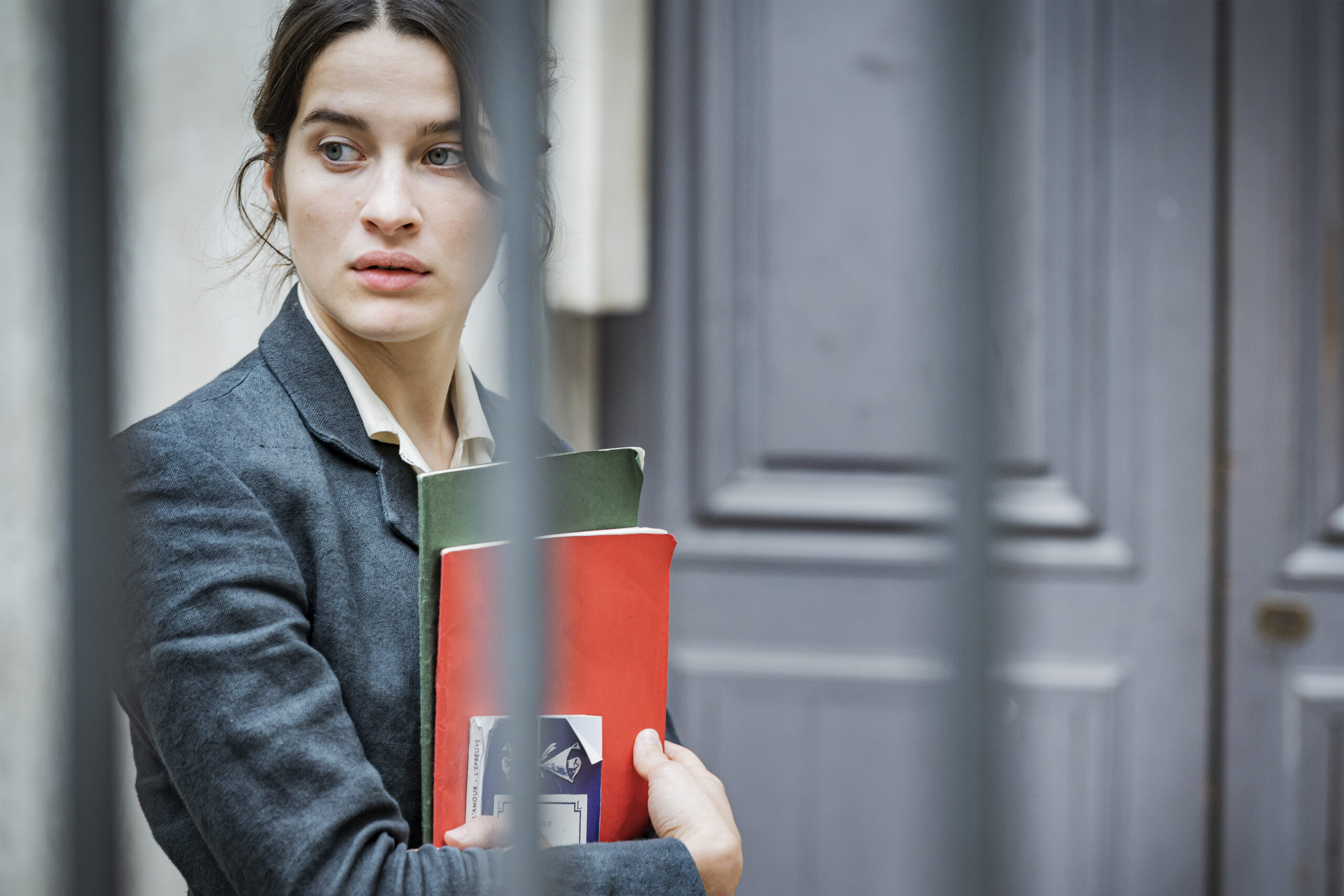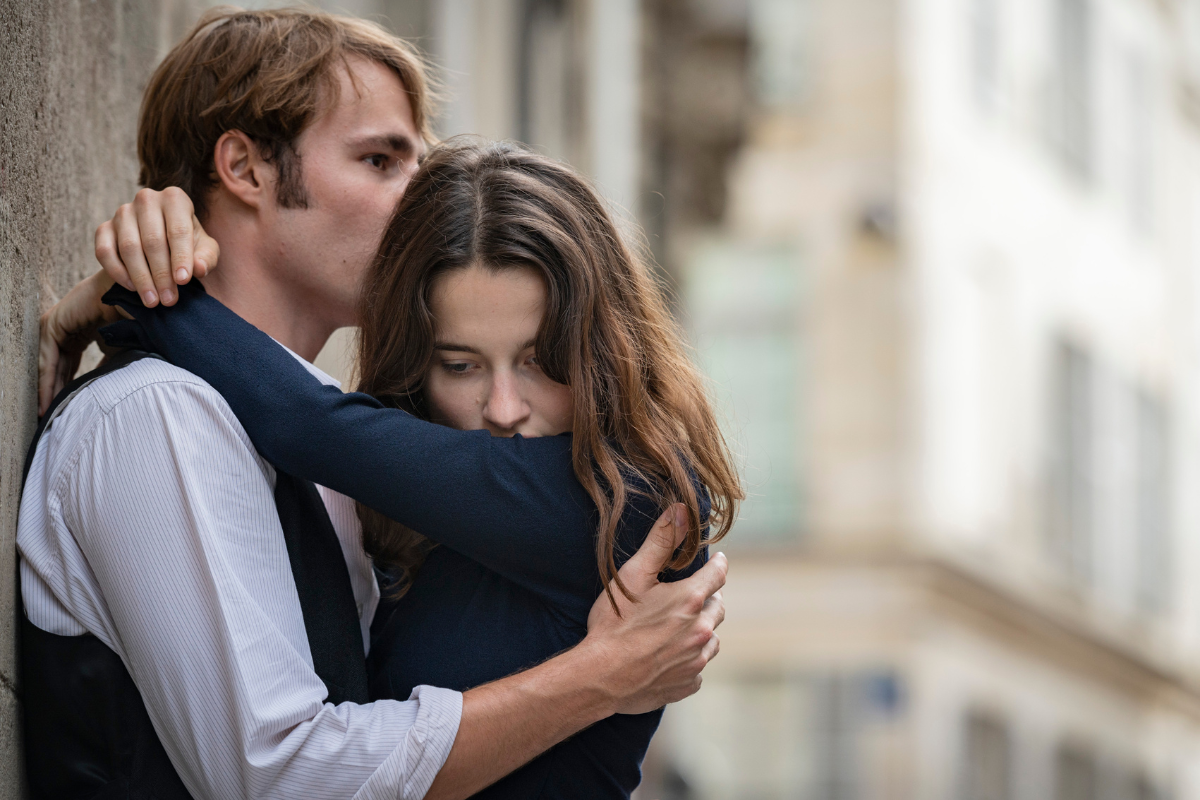“A Radiant Girl,” the 2021 film from Jewish actor and director Sandrine Kiberlain now receiving a wide release, is the rare film to trust the intelligence of its audience. It trusts that we can understand the environment of protagonist Irène (Rebecca Marder), a Jewish teenager fixated on her audition for a performing arts conservatory in Paris in the summer of 1942. It trusts that we can balance the events of the film with the knowledge of what will happen to Irène, her family and all of the city’s Jews without being shown a grisly portrait of the Holocaust. Kiberlain made the conscious decision to avoid literal violence onscreen and to focus on the everyday life of one family. It’s easy to recognize in retrospect that the time leading up to the Holocaust was full of life or death decisions, but when you’re 19 like Irène, all decisions — whether or not to pursue your crush and when to kiss him, whom to invite to dinner, how to wear your hair for a theater audition — can feel life or death.
The result of Kiberlain’s subtlety is a film that shows how violence can become embedded in a culture without drowning the audience in images of blood and gore. “It was very important for me not to show the symbols of Nazism,” Kiberlain says. “I wanted to work with the idea of silence” — both the silence of Irène’s family as they avoid conversations on encroaching doom and the silence of the people around them, who may be immersed in the same sense of denial.
Irène prepares for her audition and chases after Jacques in the summer of 1942, just before the Vel d’Hiv rafle, or roundup, of about 13,000 Parisian Jews. Irène, of course, does not know what lies in front of her, even as the viewer knows that her performance of Marivaux’s plays will have no bearing on her fate. Marder, however, had trouble divorcing herself from this knowledge: When she was fourteen, she was featured in “La Rafle,” a film about Jewish families and children who survive the internment in Paris’ sports stadium during the rafle and are then deported to transit and extermination camps. “I had to forget everything I knew to not apprehend the scenes,” Marder says of her approach to Irène and the film’s timeline. The experience was made even more challenging by her recent performance in a film about the life of Simone Veil, a French Holocaust survivor who went on to oversee the decriminalization of abortion in France; Marder traveled to film in Budapest, where reconstructed concentration camps served as the backdrop for “La Rafle” and many other modern Holocaust films.
Though she has a happy-go-lucky approach to life and chastises her older brother, Igor (Anthony Bajon), for his panic over French antisemitism, Irène is not a fool: She simply chooses to live her life to the fullest while she can, embracing the freedom of her youth while it is available. Irène knows that the environment is turning against Jews “on a sensory level rather than a more intellectual level,” Kiberlain says. Marder’s portrayal allows the audience to celebrate the simple joys of Jewish life without neglecting stories of the Holocaust — but without exploiting them, either.
Kiberlain made her career as an actor in French cinema before developing “A Radiant Girl,” her first feature as a director, which premiered at Cannes. Her family had emigrated to France from Poland to escape antisemitism and the violence that soon came at the hands of the French government. (Her grandmother was pregnant with her mother when she narrowly avoided arrest in 1942.) In the film, Irène’s father, André (André Marcon), distinguishes between Eastern European Jewish emigres in Paris and Jews who are, in his view, French. Even when Polish Jews begin disappearing and rumors of their arrests circulate, André holds steadfast in the belief that because his family is French, they will be safe if they play by the rules: turning in their identification cards to be stamped “Juif,” sewing yellow stars onto their clothes, even giving up their phones, radios and bicycles to isolate them from the outside world.
“French Jews were threatened, but in a sense, they did not feel themselves threatened as soon as they felt the foreign Jews threatened,” Kiberlain says of the distinction. “I wanted to show the kind of naïveté that they had, and to show the responsibility that France had.”

France’s role in the Holocaust remains a controversial topic in both the public consciousness and the French government. Kiberlain does not shy away from blaming the French police in “A Radiant Girl,” but she also shows the power that non-Jewish neighbors had to protect vulnerable people in their communities. Irène’s boyfriend, Jacques, hides her bicycle at his apartment when she must turn it in to the police, allowing her to ride freely through the woods. Josiane, a friend who may harbor a crush on André, offers to write summaries of the news each week when Jewscan no longer read the papers. Irène’s family invites Josiane to Shabbat dinner and gives her a rundown of all the year’s holidays so she can learn about Jewish traditions, dipping apples in honey although it’s the middle of the summer; it’s a poignant moment as the audience realizes that the family may never again have the chance to celebrate Rosh Hashanah around their table. “Personally, I like Jews,” Josiane offers awkwardly, solidifying her place as an ally to the family and providing a moment of levity.
In “A Radiant Girl,” Kiberlain makes the same choice as a filmmaker that Irène makes as a Parisian Jew: to focus on life. The film does not lie or patronize the audience, but instead allows us to process the changes to French society along with the characters. Kiberlain’s striking depiction of the film’s final moments is a reminder of the power that violence, both graphic and understated, can hold over a people. It reminds us, too, that silence is a powerful cinematic tool that can speak volumes.
“A Radiant Girl” opens Feb. 17 in New York, followed by a national release.



